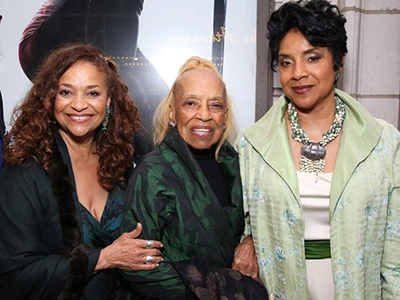(Source: The St. Louis American)
Vivian Elizabeth Ayers Allen, the Pulitzer Prize–nominated poet, cultural activist, and mother of beloved Black cultural icons Debbie Allen and Phylicia Rashad, has died at the age of 102.
Debbie Allen shared the news of her mother’s passing via Instagram with a post that included a photo montage set to Stevie Wonder’s “Golden Lady,” and with the text “Into the Eternal Light Vivian Ayers.”
According to the post, she died on August 18.
“Mommie you have transformed into that cosmic bird Hawk that lives and breathes Freedom,” the Emmy-winning choreographer and actress wrote in the caption. “We will follow your trail of golden dust and continue to climb higher. We promise ‘to be true, be beautiful, be free.”
Ayers Allen, born July 29, 1923, in Chester, South Carolina. She attended Barber-Scotia College and Bennett College.
Her marriage to Andrew Arthur Allen Sr. produced four children—musician Andrew “Tex” Allen Jr., actress-choreographer Debbie Allen, banking executive Hugh Allen, and actress Phylicia Rashad. Following their 1954 divorce, Ayers Allen continued to build on a remarkable legacy as a Pulitzer Prize–nominated poet, playwright, literary agent, activist, and cultural curator
In 1952, she wrote the poetry collection “Spice of Dawns,” which earned her a Pulitzer Prize nomination. In 1957, she wrote “Hawk,” an allegorical poem set in outer space. In 1966, she became the first Black faculty member at Rice University in Houston.
Allen was one of the Hidden Figures of the Apollo 11 Space Mission. Last year, on the eve of the 55th anniversary of the Apollo 11 Moon landing, National Aeronautics and Space Administration (NASA) honored Allen and others at the NASA Johnson Space Center in Houston, Texas by renaming Building 12 to the “Dorothy Vaughan Center in Honor of Women of Apollo.”
Allen received Honorary Doctorate Degrees from her alma mater, Bennett College, and Wilberforce University.
“The rearing I received from my mother, words cannot express,” Rashad once said in an interview from her days as Claire Huxtable on the cultural staple “The Cosby Show.” “I could live in any time. I could live in any country. I could live on any planet – and I would be fine.”

